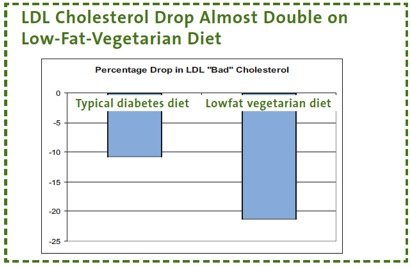Low Fat Vegetarian Diet Wins
The August 2006 Diabetes Care journal reported on the impact of either a very-low-fat vegetarian (VLFV) diet or a control diet consistent with the current American Diabetes Association (ADA) diet guidelines.

In previous trials using a VLFV diet or a very-low-fat near vegetarian diet, dramatic improvements in insulin sensitivity, blood sugar, blood lipids, blood pressure, inflammation markers, oxidative stress, and other cardiovascular disease and reduction in diabetes medication needed to control blood sugar levels have been reported in people with Type 2 DM.1 2 3 However, these clinical trials have been criticized for their short duration, accompanying exercise recommendations, and/or the lack of a control group. In this current study there were no exercise recommendations for either group and subjects were randomly assigned to each of the two diet groups and the study lasted 22 weeks.One likely factor contributing to the superior results of the low-fat vegan or near vegetarian diets may well be a reduction in AGEs and increased intake of anti-oxidant phytochemicals. Consuming a diet rich in AGEs has been shown to promote many of the complications of diabetes and restricting the amount of AGES and other pro-oxidant compounds in the diet appears to help prevent these complications of diabetes.4Bottom Line:Scientific evidence suggests the current dietary advice from the American Diabetes Association, American Heart Association, and the National Cholesterol Education Program is less effective than a very low fat, near vegetarian or vegan diet rich in whole grains, vegetables and fruits for treating those with type 2 DM or cardiovascular disease.People with type 2 diabetes or prediabetes, who want to lose more weight and improve their blood sugar and cholesterol levels can do so with the proper should be informed that greater reductions in animal products, particularly those high in fat and other high-fat foods along with increased consumption of fruits, vegetables and whole grains is likely to more dramatically cut their risk of cardiovascular disease and diabetes complications and or reduce their need for medications.By James J. Kenney, PhD, RD, FACNReferences:1. Prev Med 1999;29:87-912. Am J Med 2005;118:991-73. Diab Res and Clin Prac 2006;73:249-594. Circulation 2004;110:285-91